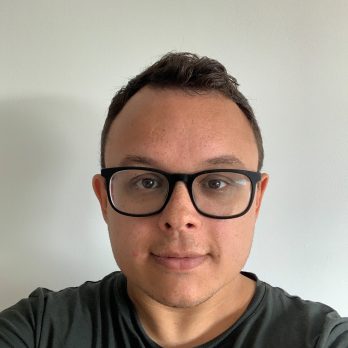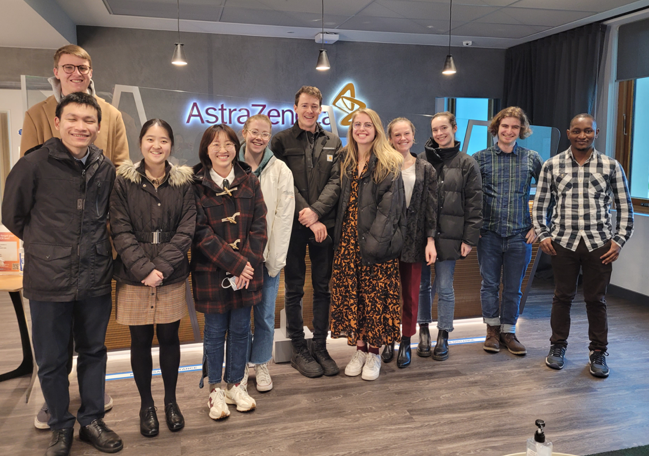Ashley Dickson
Health data science PhD student at University College London (UCL)
Ashley Dickson joined the PhD programme after a wide-ranging NHS career. Now 35, Ashley has an academic background in music, maths, economics and programming – and is keen to address fundamental issues in public health in his research.

Tell us bit a bit about your early life
I’m from Birmingham, and my paternal family came from Grenada as part of the Windrush Generation. I went to a comprehensive school in Birmingham that was rated very poorly by Ofsted. But from a young age I loved learning, maths especially. I went to The Sixth Form College for my A’ Levels and then to the University of Birmingham where I studied a combination of music and maths.
Why music? Well, I’d been sitting in music class one day at school in the early years; my teacher was playing this lovely old Steinway and I was mesmerised. I asked my Mum for a keyboard at Christmas. She bought me a small piano, enrolled me in lessons with a local piano teacher, and I’ve been playing ever since.
What happened next?
After university, I tried working in a bank and didn’t like it. I was selling loans and credit cards. Financial services don’t hold much interest for me, as it were.
Then my dad, who was a paramedic, told me that the NHS had a Graduate Management Training Programme. I applied for the informatics management stream, which included an MSc in Health Informatics here at UCL.
That was about 2011, and the rest is history. I became an NHS informatics person and then spent a few years doing jobs that helped to broaden my experience. I spent time in Bath and North-East Somerset, doing commissioning analysis work, and in Bristol doing academic stuff with geographic information mapping.
Later I went to Imperial College Healthcare as a service manager for St Mary’s Hospital in the sexual health clinic. That was a great role. It involved running a clinical service for a department that was like a hospital in microcosm – an entirely closed ecosystem – so I really got to understand the nuts and bolts of care delivery.
What have you been doing between then and now?
I went back into informatics, as a Senior Analytical Lead, doing work on optimising the patient experience, developing novel analytical techniques to understand and improve hospital-initiated cancellations, modelling clinical pathways and appraising options to redesign them, and so on.
That was at St Mary’s still, and then I got an opportunity to move to NHS England to work on national policy. Since 2017 I’ve been working on options to redesign the way that healthcare is reimbursed.
My biggest project has been in Adult Critical Care (ACC), which has been propagated quite widely now.
Your career was going well, so why the PhD?
There are lots of problems that I see around that can’t be tackled with the standard analytical techniques. If you’re working for the NHS on pathway optimisation you can run some statistics, but ideally you’d want a theoretical model of an ideal pathway, so you could compare that to the real world and see the discrepancies.
I am interested in answering big questions about health itself; and these either haven’t been asked before or they need novel answers. It was working in ACC, with all the issues about allocating resources on the basis of need, that made me think that there’s a need for a more general model with a sound theoretical framework as its basis.
A particular service can be modelled fairly easily; for example at population level, ACC need is a function of age, deprivation, ethnicity, and so on. But my underlying drive is to generalise that completely; to say, “what does health look like?”, and “how do we know?”. So, if you have a bunch of people you would ask, “what do I need to know about you to predict how healthy you are now and how healthy you will be in 10 years’ time?” This PhD is the perfect place to investigate these sorts of questions.
So, your interest is preventative care?
If you want to categorise it, it probably sits within public health, and how to optimise the health of a population. This can be preventative, or it can be acute intervention for a specific disease. But I see it more broadly than that.
How did you hear about this programme?
While I was working at NHS England I was also studying philosophy and was looking for philosophy PhDs. By coincidence, I found HDR UK and the exciting work they were doing. Some of it has a philosophical angle – like ethical science and health inequalities in AI – but I was also excited to see that HDR UK’s work so closely aligned with my wider interests.
What attracted you to this programme rather than another one?
It stands in stark contrast to pretty much everything else. Firstly, it’s four years, starting with a foundation year. You’ve got this freedom in the first year to figure out what interests you, to explore the scope of the territory and find what problems and techniques you want to engage with.
With other PhDs, you write a proposal, and then you’re narrowly confined to that space, and it might not be the right space for you in the end. Or else you’re put on a pre-existing project, which may be fine.
There are also all the links with different organisations – all the universities, HDR UK itself, the Wellcome Trust, The Alan Turing Institute – and countless NHS partners to which I would never have access otherwise. The networks of people and organisations come together all the time to talk shop and showcase their brilliant research; it’s a fabulous opportunity to find out about innovations and new techniques. And crucially, you can just say ‘can I get involved with you on that?’ and people are delighted to invite you in.
I think the most important thing is that it’s self-led. I’ve known a few PhD students who are waiting to be told what to do by their supervisor. They are still in master’s level mode. This programme lets you find a problem you want to solve and doggedly go after it on your own terms and you will be supported to see your project through to completion.

